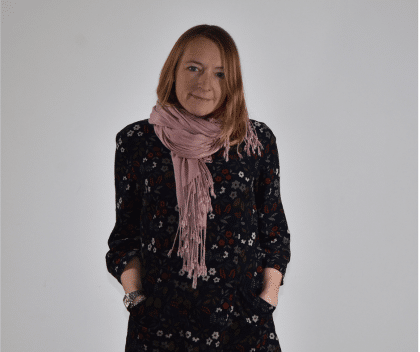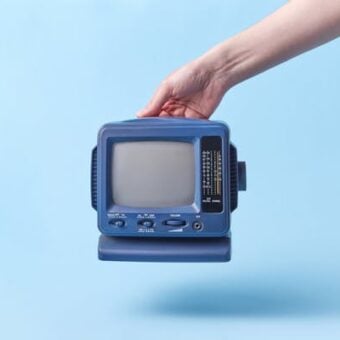

The Illustrated Child
Prologue
You probably know me: I’m the Kemp Treasure Girl. Maybe you had the books as a child. Perhaps your dad read them to you in those wilting hours of sleep where books become dreams and dreams become books. Did you look for the treasure, digging in your garden, unsure of what you were searching for?
Mine was an unusual infamy for one so young. Not an all-encompassing, celebrity fame, but one that flattened me into two dimensions and picked out the colour of my eyes and my dress. One that stopped people in the street and made their necks crane back round to gaze at me.
The version of me in the books was my friend. She was always there for me, sharing in my adventures, appearing at the lifting of a page. But children grow up, and as I grew taller and wiser, Romilly Kemp in the book stayed young and innocent, a sickly-sweet imposter who wore my dress and suckled at my father’s love, leeching it away until there was barely any left for me at all.
But then I made a real friend. Someone I could trust: Someone who knew intimately my deepest, darkest thoughts even if I dare not acknowledge them myself.
Chapter One
Braër was an ancient farmhouse. A month of living there had still not unearthed a fraction of its secrets.
As I ran from the house, tugging on unfamiliar wellies, I stared up at Braër’s mossy roof and dirty walls. The house itself was long and low and surrounded on three sides by a moat clogged with cowpats and slime. Dad told me that it had probably once been called Brother Farm, but time and the soft Suffolk accent had changed it.
On the south side of the house, down an overgrown path stretched a bumpy meadow filled with sagging grass. It was the perfect camp for my newly invented invisible army, and the edge of my territory. I could go there on my own, making pretend campfires and having sword fights with prickly bushes, knowing that I was safe. I could barely see the house above the long, scratchy grass.
As I set off down the path, a sharp whistle brought me back. Dad was stooped in the back door, his huge shoulders nearly touching the frame on either side. Something small and snow-like was curled up in his open palm.
“What is it?”
“I wanted to draw one, so, why not?” He said, planting the tiny kitten into my eager arms, and suddenly it was mine. “It’s a Siamese,” he said, wiping his hands on his trousers, leaving a snail’s trail of white fur on the corduroy.
“Is it a girl or boy?” I asked, trying to look through the fur at the correct place.
“A boy. I’m going to need to paint him. And you. I have an idea…” he trailed off. Frowning at me, he turned on his heel and entered the house, leaving the kitten and I alone.
I examined his bony body. He was small and soft, and smelt of wee and sawdust. He had pale creamy fur tinged with chocolate brown at each edge. As I was studying him, he uncurled himself, tipping off my arms and towards the moat below us. I caught him by the tail just in time, tucking him back safely into the crook of my arm. He opened his eyes for the first time and stared at me with big, red-blue irises. He was hot and slightly sticky-damp in my hands; just like me, I thought, and I loved him immediately.
I balanced him on my shoulder and made my way up the two flights of stairs to my bedroom, filling the kitten in on the minutiae of our lives.
“Dad lost his university job,” I said, tickling him under his chin as I ran up the second staircase; the tiny windy one that Dad was forever tripping up on. “He says we’ve moved here so he can paint instead of work. I’m going to be seven soon, and Dad says he might have to give me a painting instead of a real present for my birthday, but that’s ok by me because his paintings are like stories made real. He says someone has to make money, or we’ll be living on bread crusts and moat water, so I thought I might sell some stuff outside the house. I’ve found some nice pebbles and I tried to paint them, but I’m not very good at painting. So I wrote poems on them instead, but I’m not very good at poems either, so I dropped them in the moat. Now they’re covered in slimy cow poo. Here, this is us.” I pushed open the three foot high door that marked the entrance to my vast bedroom.
The kitten perked up as we climbed through into the huge, bright space. It was the shape of a tent, one of those old-fashioned tents – a huge triangle. And it felt like a tent too: When it was windy outside, the air caught beneath all the beams and vibrated until you felt like there was nothing but thin canvas between you and the sky.
“You look like someone important. And important people have long names. How about Captain Montgomery of the Second Regiment?” Montgomery seemed satisfied with his name, and curled up on the bed.
On that first night his mews pierced my dreams. He wrapped his pulsing little body about my head on the pillow, and I found him in my dreams too, popping into existence in the middle of a sweet shop, then a flowery meadow, the little bell on his collar rattling shrilly, announcing his arrival and preceding his loud meow.
On waking the next morning he followed me round the house, and Dad soon joined us, stooping to sketch us whenever we stopped, wiping his dark hair out of his eyes and grasping his stubby pencil.
Dad’s love of drawing had always been a part of him, but since we had moved to Braër it had become an obsession. His fingers, when they stroked the fringe from my face late at night, had the sharp tang of lead on them, and the skin of his face had echoes of paint and pastel, especially under his eyes, where he had rubbed them so often in frustration. I had the feeling that moving to such a ramshackle house had made Dad start to go ramshackle too. His jumpers, once smart, had started to become holey and smattered with the baked bean juice that he sipped straight from the tin. And so he followed Montgomery and I through the house, his knees creaking as he crouched down to get a better angle of us.
It was only by the end of the second day of kitten ownership that I managed to shake Dad off, creeping back to my bedroom, the little cat on my shoulder. I shut the door quietly so as not to let Dad know where we had gone. I needed to show Montgomery something secret. Hidden in the middle of my bedroom, beneath my huge bed, was a special floorboard. Below it, in the small dark vacuum, were my favourite things; a musty snail’s shell, a rusty bolt with a star shaped end that I’d brought from our old house, and my most treasured possession: A shiny yellow coin I had found the day before in the middle of the meadow, which might or might not be real gold, but was probably plastic. Montgomery grew disinterested quickly, squatting nearby and releasing a large and very liquid poo.
Later, in the slumbering twilight hours of my bedtime, when Dad and his drawing pad had finally let us be and my tired mouth could no longer accommodate the syllables of my new kitten’s name, Montgomery was condensed down to Monty, and then just Mont. I held him close and inhaled his buttery smell.
I lay back, eyes half closed, listening hard for the battalion of soldiers that often left the meadow at night to keep their march on the stairs. Their marching tonight was soft, as if their feet were clad in slippers. They condensed into one soldier, a bearded, paint covered soldier that melted into the form of my dad as he sat on the edge of my bed.
“Sorry for hiding.” I mumbled, turning my cheek so it nestled into the soft corduroy of his leg. I felt his hand on my head. It was big and heavy. I liked it.
“What story shall I tell you tonight?”
“The one about the Rabian Nights.” Dad’s stories were full of colour even though he never had any pictures to go with them. You could smell the hot spicy night air and the sweating horses as they galloped across the sand. Mont jumped from my neck and landed with a soft thud on the bed. As he began the story, Dad ran a hairy finger along the length of Monty’s tiny spine, exploring the kitten’s bones as he spoke of strange fruits and spiky plants, turbaned men and glittering jewels. I closed my eyes and I was there, a bearded man with coffee skin and dark eyes swooping in at me amidst a cloud of fragrant air.
Dad left me dozing quietly, my mind on flying carpets and dancing snakes. When he had gone, I opened my eyes and scooped Monty up, wrapping him round my head like a turban, his tail covering my face. My finger inched its way under the floppy skin of his belly to find my mouth, and the light beyond Monty’s fur flickered out as my eyelids closed.
Chapter two
“It’s done in oil paint. I thought I might sell it.” Dad said, his hand gently stroking the thick swirls of the painting he had unearthed from one of the bedrooms, as if he could manipulate the long-hardened brush strokes. “This is where we are now.” he said, pointing to a tiny line of black far up at the top left of the painting.
“What is that?” “It’s the roof of Braër House.”
“And are we in that house, too?” “A version of us is.” He answered, putting me down on the floor. “Is it the version where Mum still lives with us?” Dad stared at the little roof in the
painting. “Is there a painting like this one in that Braër?” I continued, unperturbed. “Yes.” He said finally.
“And which version of me is looking at it?” “The version that doesn’t ask so many questions.” I wondered if there was a version of me that didn’t ask questions at all. It must be a
very boring one. “Did you paint it?” It wasn’t his normal style. It was dark and old fashioned looking. “No Romilly, I found it in the back bedroom. I don’t know who it’s by, but whoever
they are, they’re probably dead now. Anyway, it must be lunchtime.” He looked hopefully around for a clock.
“I’m not hungry.” I said, catching sight of Monty as he trotted past the door. I left Dad studying the painting, and wandered into the dining room to look for the kitten. The day before I had found a really useful hiding place behind the table. The wall down near the carpet was crumbly and appeared to be made of hair. Thinking of dead bodies and mummified cats, I had pulled at the hair, hoping for at least a fossilised baby. Instead, a great lump of wall came partly away. I had put my hand in the hole and felt around. The ground inside the wall felt all rough and cold. When I pulled my arm out, my hand and sleeve were black. I had since discovered an old bottle of nail varnish in the upstairs bathroom. It smelt of pear drops and made my eyes water. I was on the hunt for a good hiding place for it. Forgetting Monty, I got down on my knees and inspected the hole again. It was blacker than I remembered. If I screwed my eyes up I could almost see spiders in it, tumbling about, spinning their sticky webs.
Disappointed, I carried my little bottle outside instead. It had rained in the night, and everything sang with the drip of water. My bare feet soon became woven in wet grass stems, and I admired my new green shoes as I swept through the garden to the old cart shed. I picked my way round the remnants of roof tiles that littered the ground, coming to a stop at the water butt that stood under the guttering. Mouldy snails floated in the water, covered in a film of green slime and exuding a smell like rotten cucumbers. I held the nail varnish above the water, poised to drop it, mesmerised by the smooth khaki surface. But then a particularly bulbous snail floated past, putrid and engorged with slime, and I changed my mind and dropped down on my knees to look underneath instead. Here, the grass had grown strong and lush from the constant fetid drip of water. I quickly placed the little bottle in the midst of the grass, plaiting the blades over it to hide it completely, then sat back on my haunches and studied the effect.
“What are you doing?”
At first I couldn’t locate the voice. For a moment I thought it might be the buddleia tree that covered half the cart shed, its branches gesticulating gently in the breeze. I stood up.
“Who’s there?”
“What were you doing?” The voice was more insistent now. It was definitely coming from the buddleia. I looked carefully between the branches. A mop of tawny hair and two eyes were peeping over the wall behind the tree. I flushed.
“Nothing.” “Didn’t look like nothing.” “It was nothing to do with you.” “Didn’t say it was. It looked like fun, that’s all.” The eyes and hair disappeared. I
waited for them to reappear, but they didn’t. Worried I’d upset this new found being, I ran to the gate to get a better look outside the garden.
“Hello?” I asked desperately, peering through the wooden slats. The mop of hair appeared, this time attached to a muddy t-shirt and shorts, and two stumpy legs.
“You look like an animal at the zoo,” it said, “can I feed you?” “You don’t know what I eat.” The stranger put a hand in a pocket and pulled out a worm. It dangled there, trying to
turn up towards the sky, “These?” I backed away. The stranger grinned, throwing the worm on the ground.
“Want to play?” My stomach contracted. I took in the muddy clothes and a nasty looking graze to the
cheek. “Yeah.” I whispered, my eyes full of awe.
Stacey was a girl. I hadn’t been sure at first. Her hair was short and messy. It hung down at the front like two curtains over her eyes. “His eyes,” I whispered, wondering if she had lied and she really was a boy. I wondered how I could check. She had very straight teeth and marks on her cheeks that could be freckles like mine, but were more likely dirt.
We were walking down an overgrown path that Stacey said led to a river. I had never been this way before. I thought back to the water butt and the nail varnish hidden underneath it. I wondered if Stacey had seen me hide it. I opened my mouth to confide, but stopped myself. Perhaps I should wait a while: I would tell her if we were still friends tomorrow.
Stacey had picked up a stick and was beating the nettles down on either side of the path. She stopped abruptly and pointed to a giant stinger on our left.
“Pick it.” she said. “No.” “Coward. Go on.” “No.” I twisted my fingers into the hem of my jumper. I didn’t like this game. It was
dangerous. “Fine. I will.” And she bent forward and picked it. “Didn’t that hurt?” I said, my fingers contracting in empathy. She dropped the nettle
and looked at me sympathetically. “Watch what I do.” She said, a smile playing around the corners of her mouth,
revealing a big gap in the middle of her top set of teeth. She moved her hand towards another nettle, and just as she got to it, she placed her thumb and index finger on the underside of the two lowest leaves. Pushing up, she clamped the leaves to the stalk and pulled. The whole nettle uprooted itself and hung from her fingers.
“Ha!” She cried, swinging the plant to and fro and looking at my uncomprehending face.
“The underside doesn’t have prickles, silly. Here.” She proffered the nettle to me. I took a step back.
“Fine. Come on, let’s go.” Dropping the nettle, she pranced away. I watched her running, a flush of admiration rushing across my face. Setting off after her, I mounted some concrete steps that led to the river.
At the top I stopped. Stacey was already at the bottom, making her way toward the water’s edge. I turned and looked back at Braër. I had never been out of the garden before. Not without Dad.
“Stacey!” She turned and raised her eyebrows. Her upturned nose was pink. I could see snot glistening beneath it. “I don’t think I’m allowed to go any further.” As I said the words, I felt shame in my tummy. It made me want to go to the loo.
“Well, I’m going to look for buried treasure under the bridge.” And with that she turned and skipped towards the water.
I took a deep breath and gripped the railing. Slowly, step by step, I started to descend the concrete steps. Every second I expected Dad to come running up behind me, shouting at me to stop, asking me what on earth I was doing, but he didn’t. Letting go of the rail, I ran down the remaining steps and joined Stacey at the water’s edge.
She was staring into the grey depths below. The heat of an early spring had dried the banks, and the water had slunk back to reveal foul smelling mud on either side. We made our way to the bridge, and Stacey started climbing down the bank, gripping handfuls of marram grass as she went. I looked at my shoes. They were my favourites; plastic trainers with planets dotted all over them. I took a deep breath and followed her.
Stacey was already under the bridge when I reached the muddy bottom. I had to duck to join her in the shadows. A thrill rushed through me as I straightened up under the planks of wood. The river made a roaring sound here as it channelled under the bridge. It looked a lot more powerful close up.
My trainers were sinking into the mud. Every few seconds I had to pull my feet out. The mud made a sucking sound, and a great gassy waft hit me in the face. The planks of wood that made up the bridge above us echoed dully as someone walked across them. Grains of dust fell down onto us.
Stacey was scanning the ground, her eyes bright, her hair tucked behind her ears. Then, she dropped down, her fingers slipping into the mud and withdrawing just as quickly.
When she straightened up, there was a small grey pebble in her hand. The excitement I had felt when she first dived in died at the sight of it.
“It’s a stone.” I couldn’t keep the disappointment out of my voice. Stacey glanced at me, her eyes glinting in the dark shadows, but kept silent. Pocketing the stone, she continued to look at the ground.
I pulled my feet out of the mud with a slurping sound, and, ducking out from under the bridge, made my way up the bank, wiping dust from my face and clinging to the marram grass to help me up.
When I was at the top I sat down to wait for Stacey. I looked about for the person who had walked across the bridge, but the land was flat and empty as far as I could see.
“Stacey,” I called nervously. Her earthy face appeared below me. One strand of hair was slicked with mud.
“What?” She asked, tucking the muddy lock of hair behind her ear and sniffing noisily.
“That person that walked over the bridge just now. There’s no one out here.”
Stacey grinned. She climbed out and joined me on the bank, wiping her shoes on the grass to remove the clumps of mud. “Happens a lot round here. Some say there’s a man lurks near the river, waiting for little girls to kidnap.” She put her hand in her pocket and pulled out the pebble. “Here.” She said, handing it to me.
I took it. It was lighter than I thought it was going to be. The surface was smooth and greasy. I rubbed it between my hands. It began to crumble. Stacey leaned toward me.
“I wonder who dropped it?” She whispered. I could feel the ends of her hair tickling my ear. I rubbed harder at the pebble. It started to break into pieces, disintegrating beneath my fingers. That same putrid vegetable smell hit my nose. It was made of mud, but there was something hard beneath. My tummy twitched as a flat surface met my thumb. A pound coin fell onto my lap, brown and rusty, but solid and round.
“Buried treasure.” Stacey said.
“It’s like magic,” I said, “ghost magic.” Stacey nodded, her face serious, staring out at the flat fields that surrounded us.
“You need to see the shrieking pits. That’s proper ghost magic.” She leant back on her elbows and raised her eyebrows, waiting for my reply, knowing it was coming.
“What’s the shrieking pits?” I asked obediently in a whisper. The grey sky dropped lower on the landscape as if it were listening too.
She leaned in to me and looked me in the eyes. I noticed her left eye had a dark grey slash across its green iris. “No one knows why they’re there. Some say they’re millions of years old, ancient holes that have filled up with rainwater. Others say they were dug a hundred years ago; people quarrying for rocks and flint. But sometimes, weird noises come from them. Screams and cries for help. And people see things when they’re near them.”
“Things?” I murmured, almost not wanting to hear her answer. I was beginning to regret my trip to the river.
“People. Acting weird. Ladies dressed in old fashioned clothes.” “Have you seen them?” I held my breath, my body stiff, waiting for her answer. “Nah. I don’t even know where they are. We should go looking sometime.”
I scratched at the coin in my palm, relieved. Flakes of metallic mud fell away. Stacey got up from the bank, brushing the dirt from her shorts.
“You keep that, it’ll bring you luck.” She said. “People lose money all the time, make sure you don’t lose it.” She smiled. She had a pretty smile. It transformed her face.
“You look like a girl now.” I said. She laughed. “That’s why I don’t smile very often. I wish I was a boy sometimes.” “Why?” She kicked at the grass. “I don’t know. Boys have it easy. They fight better.” I glanced at the sky. Behind the low clouds the sun had begun to peer out. We were
both squinting in the hazy light. “I’d better go home.” Stacey said with a sigh. “Can we play again?” I nodded,
squeezing the coin in my hand. “Right ho. See you, wouldn’t want to be you!” She grinned at me, the gap in her teeth
flashing blackly, and then she was off, running across the grass. I watched her go, jealous of the speed at which she could run. I looked at the watch on my wrist, and wished it was more than a plastic toy. Dad would be frantic. I started on my way home, the mud on my trainers weighing me down like an astronaut with moonboots.
Chapter Three
I wanted to see Stacey again, but every time I thought about climbing the gate and going looking for her, I felt a sick feeling clenching in the pit of my stomach. Dad hadn’t mentioned my mud encrusted trainers, but they appeared on the washing line the next day, clean and sopping, with muddy drips leaking from the ends of the laces. They took three whole days to dry.
I hung around near where I had first seen Stacey, pretending to catch butterflies in my net and keeping an eye out for her watchful gaze between the buddleia’s branches.
On a hot May night I woke up, the echo of someone screaming in my ears. I wondered if it was the women from the shrieking pits screaming far, far away. I lay in bed and held my breath, listening extra hard, but all I could hear were Monty’s cat snores.
Everything about my time with Stacey had been ghostly and mysterious. I jumped out of bed and scrabbled at the loose floorboard, in need of proof that I hadn’t imagined the whole thing. My hands groped blindly into the deep hole beneath, and there it was, sat on the joist I had placed it on the day she gave it to me: The rusty pound coin. I held the pound tightly and got back into bed, kicking the hot covers off my legs, and I thought about Stacey, conjuring her up in my mind.
“Stacey, Stacey, come back to me.” I chanted under my breath, clutching the pound coin so hard it hurt, my eyes squeezed shut. When I opened them, I half expected her to be standing at the foot of my bed, moonlight-coloured and see-through, but of course she wasn’t. The next time I saw her, I thought, I would resolve to touch her, to make sure she was real.
The chanting didn’t bring Stacey back to me, but it did bring another kind of magic. The circus came to town.
I sat in the shade of the weeping willow waiting for Dad and scratching absentmindedly at my bottom. It had begun to itch the day before, and I was enjoying the sensation of raking my fingernails inside my pants, deep in the crevice behind me that I had never seen. I pulled my pants back into place and ran my hands over the tiny squares of my best dress; a pink gingham one with an elasticated bodice that dug painfully into my armpits.
“Where are my keys?” Came Dad’s frustrated voice from somewhere in the depths of the house. I made myself blend into the willow’s spidery branches. He had lost his keys three times this week, and made me search for them every time. This time he could do it on his own.
I had wanted Stacey to come too, but I had no way of asking her so I’d kept quiet. Instead I had asked if Monty could come, worried he would miss us, but Dad wasn’t sure cats were allowed at the circus. On the odd occasion that we had gone out before, we had come back to a kitten with no voice from mewing so loudly. He was halfway to being fully grown now, and would no longer fit on my head as a turban, but he curled snugly round my shoulders instead.
“You could have him made into an elegant stole once he’s dead,” Dad said, stroking Monty’s soft fur covetously, “wrap him around your shoulders when you’re an adult, then he could go with you wherever you went.” I looked at Dad’s face, trying to work out whether he was joking or not, and then I remembered Dougal, his Jack Russell who stood eternally and stiffly in a glass cage in Dad’s study, and I shuddered.
The Circus – so important it required capital letters – was on top of a hill. We parked at the bottom, and as we made our way up the soft grass a warm waft of animal smells filtered down to us with a hint of candyfloss and poo. Dad took a deep breath in through his nose and pummelled his chest.
“How could you capture that in a painting?” He asked me. I ignored him.
Inside the circus tent it was dark and hot. My eyes took a while to adjust and I sought out Dad’s hand, dry and warm round my own. We took our seats halfway up a flimsy stairway. Dad’s seat creaked, while mine merely sighed. I couldn’t see much over the heads in front of me. I pulled at the elastic of my dress, scratching at my hot skin, and rubbed my bum on the seat to satisfy the itch. A man in a black and red suit made his way over to us, whispering into Dad’s ear. Dad indicated that we should follow him. We navigated our way back along the row, Dad’s gruff voice apologising as person after person had to stand to let us out. The man in red and black took us to some seats right at the edge of the ring. These ones didn’t creak as we sat down. From here I could see everything. I craned my head back to look at the very top of the tent.
“This is more like it!” Dad whispered as he whisked a couple of toffee apples from a passing tray.
We made our way out through the milling crowd. Night had begun to fall, and the air had lost its warmth. Dad wrapped his huge jumper round my shoulders. We stopped just outside the tent and looked out from the top of the hill. From here, Suffolk lay flat all around us, like we were on the only hill in the world. The first lights of houses and streets could be seen against the yellow blue sky.
A horse from the show pranced past us, coming to a stop nearby, its huge feathery headdress shimmering as it tossed its head. The woman leading it stopped too. She was a strange, glittery creature. A glimmer of sequinned leotard peeped out from beneath a brown belted coat. Her chestnut hair was set in waves, and she had the same pink feathery headdress as the horse she was holding. She smiled at me, a knowing, thoughtful smile. I retreated further into Dad’s jumper.
“Thanks for getting us such wonderful seats,” Dad said, his voice lighter than I had heard it before, as if the toffee apple had varnished his throat on the way down.
“Don’t be silly, Tobias. Anything for such a pretty girl.” She pronounced it ‘preetty’, and she crouched down and smiled at me again, the pink feathers on her head nodding at me like insect feelers. From here I could see a great gorge of white cleavage encased in pink sequins. She was like a butterfly that had settled just for a moment. I held my breath, careful not to blow her away. She studied me, her head on one side, then reached up and plucked a feather from her headdress.
“Here,” she said, offering it to me, “a pretty feather for a pretty girl.” Her voice wasn’t the hushed Suffolk sound that I had heard a lot of recently. I wondered if she was Scottish. Or Irish. I took the feather and whispered my thanks.
Later that night I climbed into my bed, my fingers reaching for my bottom again. It wasn’t so nice to itch now, it felt raw instead of tickly, and it made me want to scrape harder, tearing the soreness away. Stacey’s rusty pound was on my bedside table. I picked it up and put the feather in its place, running my finger round the coin’s rough edge. Dad climbed through my doorway and sat on the bed, watching me for a moment.
“Treasure?” He asked. I nodded. He smiled approvingly. “What story shall I tell you tonight?” “The one about The Circus.” And he began. He wove our visit into a story of giant grey elephants and man-eating
panthers. I could smell the sparklers, the toffee apples and the elephant poo, which is strange because we had only been at the circus a few hours ago, and I didn’t remember any elephants when we went.
Warm arms wrapped themselves around me and lifted me down into softness. The light went out, and the sky appeared in a rectangle of window. Stars in their millions fizzed in the blackness, and Monty curled himself around my hands as the door closed quietly. A high, long musical note pierced the warm fuzz of sleep that shrouded me. I opened my eyes. A shadow stood near the foot of the bed, its arms raised; a flute at its lips. I sighed and closed my eyes again.
My rusty pound coin fell to the floor.







